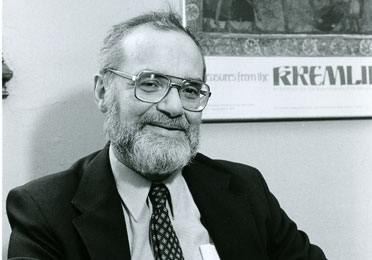Milton Ehre, 1933–2009
A measure of age and experience, or simply the passage of time, is how many people we’ve known who are no more. When you’re young, death is extraordinary, but as you age it is expected. Every generation sees it leaders, scientists, thinkers, artists, and celebrities pass out of existence and even sometimes forgotten (I’ve been asked who Clark Gable was by those who had no reason to know). While millions mourn the untimely death of Michael Jackson, I turn to the less surprising passing of Milton Ehre, University of Chicago professor emeritus of Slavic languages and literatures.
Like the late Wayne Booth and Ned Rosenheim, Mr. Ehre was one of a handful of professors who made a strong impression on me, yet of most of those I have only a specific memory or two. Saturday night at Wildfire J. recalled something his father had said at dinner years ago, and I realized how vague all my memories are. I don’t remember details or conversations, only sensations and feelings.
Mr. Ehre’s name, with its resonance with “millionaire,” made some of my classmates titter quietly. He probably knew it and was amused by it. From what I understand, he was no ivory-tower academic, nor were his classes easy. Any pre-med hopeful who thought Mr. Ehre’s or Mr. Rosenheim’s classes were going to be a free pass to a good grade must have wished they’d pursued something less demanding, like Shakespeare or Anglo-Saxon literature.
I must have liked Mr. Ehre’s teaching style because I found myself in more than one of his classes. His beard made me think of him as a human Ursa Minor — a diminutive bear of a man.
Except that he talked funny.
I came from what had to have been the whitest of white-bread towns, where almost everyone I knew from school had the unremarkable flat accent of the western New Yorker. Some parents, displaced by World War II and its ravages, spoke with European accents, but most of us with our dominant British, Polish, German, and Italian ancestries, looked and sounded as vanilla as the ice cream at Dairy Queen. My first few weeks at the small university in the big city, where I met Sikhs, Jamaicans, Koreans, Japanese, Chinese, Vietnamese, Indians, Mexicans, Puerto Ricans — and New Yorkers. That’s right, people with the truly alien accents of Brooklyn and Queens.
I don’t know exactly where Mr. Ehre was from, but it almost had to have been somewhere in New York City. His appearance, his accent, his mannerisms gave him a character every bit as colorful to me as the impression left by turbans and salsa parties.
With Mr. Ehre as professor, I expanded my literary repertoire beyond the safe confines of the British Victorians and the American storytellers. After completing Literature and Society in Modern Russia (1860–1914), a history department class which at first I left with an incomplete, then a B, Russian and Soviet history and even Baba Yaga seemed to make more sense. It was as exotic a world to me as the Japan of The Chrysanthemum and the Sword, which I no longer recall (time for some re-reading?).
Of Mr. Ehre, of whom my memories are so vague, I can say only, “He was a man, take him for all in all, / I shall not look upon his like again.”


Comments
Milton Ehre, 1933–2009 — No Comments
HTML tags allowed in your comment: <a href="" title=""> <abbr title=""> <acronym title=""> <b> <blockquote cite=""> <cite> <code> <del datetime=""> <em> <i> <q cite=""> <s> <strike> <strong>